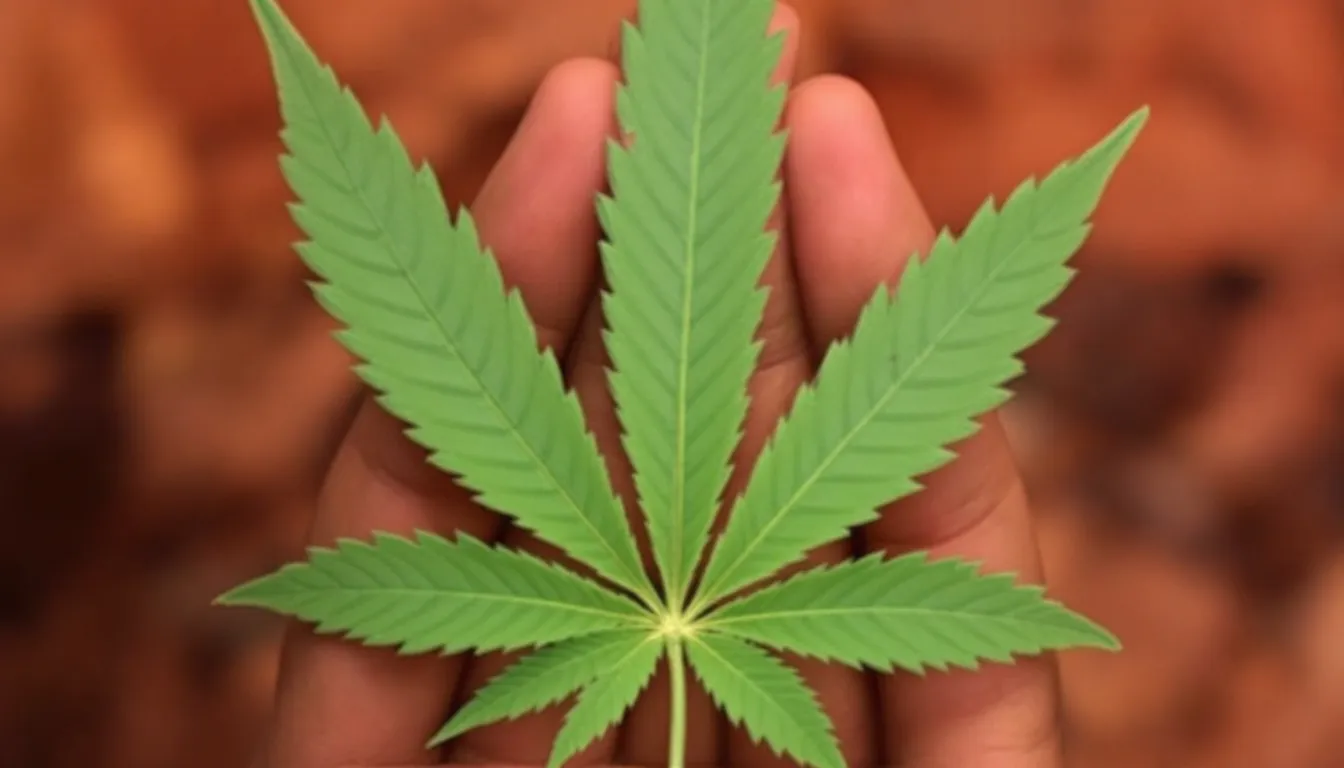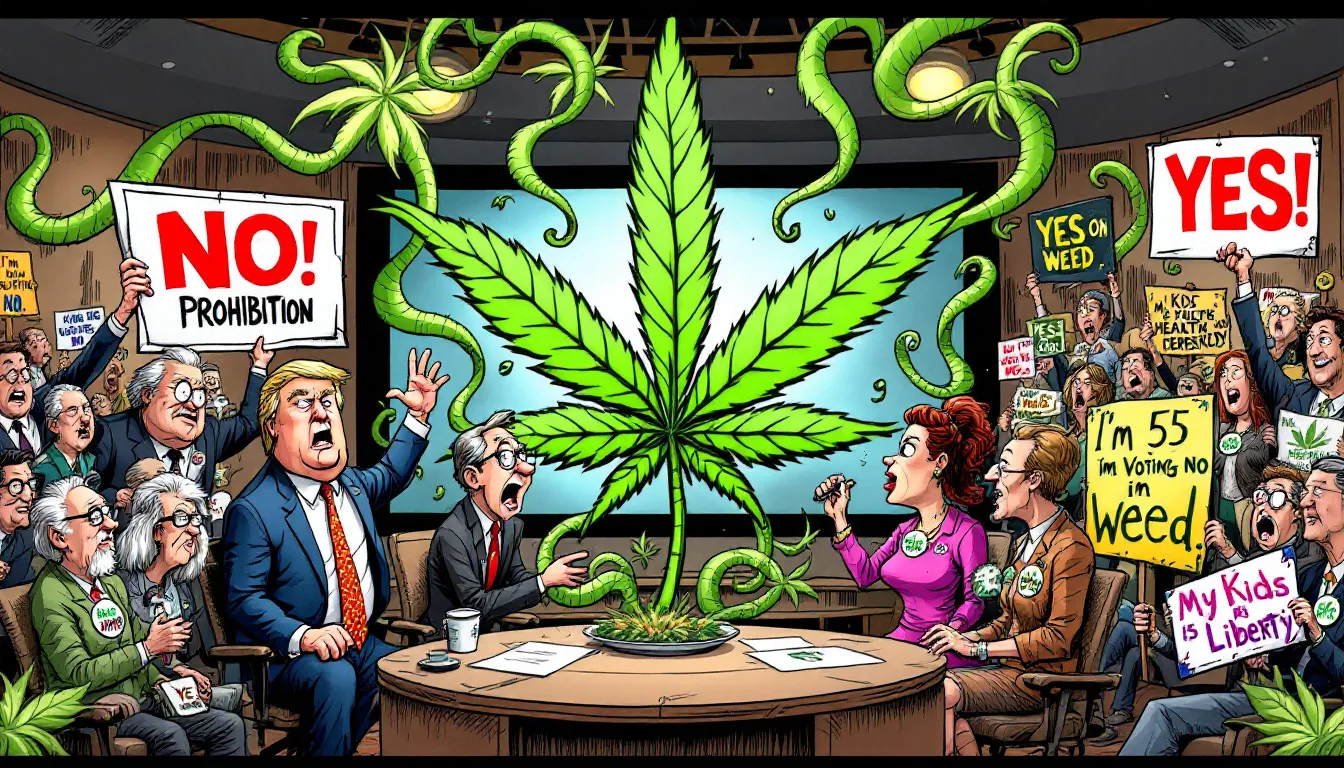2024 Cannabis Election Update: What Does Donald Trump's Win Mean for Cannabis in 2025?
Table of Contents
- Introduction
- Key Takeaways
- Florida's Amendment 3: A Close Call
- Nebraska Medical Marijuna Innitiative
- North Dakota's Measure 5 Falls Short
- South Dakota's Vote To Legalize Recreational Marijuana
- Massachusetts Psychedalics Legalization
- Trulieve's Investment in Florida
- National Trends and Implications
- Recreational Marijuna: A New Era?
- Medical Marijuana: A Bright Spot?
- Public Opinion and Cannabis
- Residential Influence on Cannabis Policy
-
Election themes cannabis products - Looking Ahead to 2025
- Summary
- Frequently Asked Questions
The 2024 cannabis election update reveals significant shifts in U.S. cannabis policy. With Donald Trump’s victory, federal cannabis reforms are expected to slow down. However, Trump is looking quite progressive on in two areas of cannabis across the nation right now, state rights and medical. He’s endorsed state level measures like Florida’s Amendment 3 which is a step towards adult use but hasn’t gone full federal legalization. He’s supporting rescheduling to Schedule III which is in line with the Biden administration so there’s bipartisan potential for more medical access and research. He’s open to cannabis reform with research, economic development and criminal justice which is where the public and policy is heading. But without full federal legalization his policy will keep the divided system where states are in charge and federal is incremental. Although, state-level initiatives in Florida, Nebraska, and South Dakota show a mixed bag of regulatory results. Continue reading and explore these new updates and their implications for the future of cannabis legalization.
Key Takeaways
-
The results of the recent elections indicate a potential slowdown in cannabis legalization efforts due to a return to conservative policies and the influence of organizations like the Heritage Foundation.
-
Florida voters responded to Amendment 3, which sought to legalize recreational marijuana, with a majority approving the measure. However, it did not meet the necessary 60% threshold despite significant financial support, highlighting the ongoing challenges advocates face in pushing for cannabis reform in conservative states.
-
Individually, Nebraska showed strong public support for medical marijuana, yet legal challenges may impact the implementation of newly approved initiatives, reflecting the complexities of cannabis policy across different states.
Introduction

Also Read: CaliforWhat is AB 1111 and 1775?
As the Republican Party takes the reins once again, there is an anticipation of a shift back to conservative stances that have traditionally resisted reforms related to cannabis. The influential Heritage Foundation, established in 1973, has been steadfast in advocating for a comprehensive approach towards drug policy. This methodology prioritizes intensified law enforcement measures alongside education focused on treatment and prevention for drug abuse. Consequently, with this ideological pivot at hand, the path toward federal legalization of cannabis is expected to be more challenging and drawn out during this forthcoming legislative term.
The media’s announcement of election outcomes not only announced a switch in governance but also hinted at potential reversals concerning progressive marijuana policies. As we peer into what lies ahead, it appears evident that recent strides made towards legalizing cannabis might encounter substantial obstacles under the new administration, which finds support from groups such as the Heritage Foundation—groups that review marijuana reform initiatives with cautionary scrutiny.
These times may present a strategic opening for proponents to craft stronger arguments backed by empirical evidence in favor of changes around cannabis legislation. The weeks approaching are set to play a decisive role regarding how U.S. marijuana policy will unfold moving forward. Despite current political shifts suggesting oppositional tendencies against legalization efforts, the conversation surrounding weed’s legality within America remains unresolved.
Florida's Amendment 3: A Close Call
In Florida, Amendment 3 was a proposition to legalize recreational marijuana for individuals aged 21 and older. It sought to permit the possession, purchase, and personal use of cannabis for non-medical reasons. Despite substantial support among the public, it failed to achieve the required 60% threshold for passage during election results—securing about only 56% in favor—which points out considerable obstacles that advocates of legalization still face within the state. Florida voters approved a medical marijuana measure in 2016, but the recent ballot measure for recreational use did not meet the necessary approval.
The push behind Amendment 3 constituted one of history’s costliest campaigns concerning marijuana legalization efforts. More than $100 million was raised largely by Trulieve. This hefty financial backing emphasizes just how significant this reform is considered. Yet its defeat indicates a departure from national trends which have typically leaned towards endorsing such measures and signifies an ongoing battle ahead.
Reflecting upon these developments post-election suggests Floridians are confronted with complex hurdles in their quest towards legalizing cannabis statewide—an effort made particularly challenging under current conservative leadership like Governor Ron DeSantis. The outcome against Amendment 3 sharply accentuates these difficulties inherent in amending Florida’s state constitution regarding drug policy changes.
Despite this setback, proponents are prompted to reassess tactics moving forward as they persistently advocate towards establishing an environment where recreational usage of marijuana is recognized legally across Florida—a vision aligning with maintaining a safe community setting. This is just the beginning of ongoing efforts to push for cannabis legalization in the state.
Nebraska's Medical Marijuana Initiative
Nebraska voters have shown a robust favoring for medical marijuana initiatives when compared to Florida. The proposed Initiative 437, which would authorize qualified patients to acquire and possess a maximum of five ounces of cannabis for medicinal use, has received resounding approval. One measure is ahead with the support of 73% versus 27%, while another claims backing from 69.2% of the population, demonstrating an emphatic endorsement by Nebraska residents to legalize medical cannabis for medical purposes.
Achieving legalization faces challenges. Submitted on June 9th, 2023 with more than 114 thousand signatures in tow, this initiative currently confronts legal scrutiny concerning those signature’s legitimacy. Final arguments over these legal obstacles are expected by November 18th, 2024. Regardless, there remains anticipation for casting votes on this matter come November fifth that year—with prevailing voter enthusiasm indicating potential success.
Advocates such as Nebraskans for Medical Marijuana championed Initiative #437 vigorously—with fundraising efforts reaching close to one-and-a-half million dollars—bolstered by hope that their cause will resonate at the polls. This strong push behind permitting marijuana’s therapeutic application showcases an expanding acknowledgement within Nebraska regarding its health merits and heralds momentum towards integrating empathy into healthcare practices statewide.
North Dakota's Measure 5 Falls Short
In North Dakota, Measure 5 which sought to permit the use of marijuana for adults was marginally rejected by voters. 52.5% stood in opposition. The measure’s provisions would have granted adults the right to possess predetermined quantities of marijuana and cultivate a limited number of plants. It aimed at establishing regulations governing the production and sale of marijuana by October 2025.
The unsuccessful bid made by Measure 5 underscores the persistent struggles proponents of cannabis face in traditionally conservative regions. Despite projections suggesting potential state revenue gains exceeding $10 million, this loss as indicated by voters points to an essential need for ongoing efforts in advocacy and education about cannabis that could influence public perspective moving forward.
This contrast is evident when considering Nebraska’s progress towards embracing medical marijuana compared with North Dakota’s recent rejection regarding adult use legalization—demonstrating a varied approach toward cannabis legislation across different states within America.
South Dakota's Vote to Legalize Recreational Marijuana

In South Dakota, a proposal known as Measure 29 aimed to legalize the use, possession, distribution, and production of recreational marijuana for individuals aged 21 and over was decisively turned down by voters—with 60% standing against it. The measure would have permitted adults to possess up to an ounce of cannabis with restrictions on where it could be possessed and clarifications regarding employer policies.
Resistance from local community groups and law enforcement agencies played a significant role in confronting Measure 29 due to concerns surrounding the regulation of marijuana sales. This development is regarded as a major blow for those advocating legalization within South Dakota—especially after an earlier victory in legalizing cannabis in 2020 that was later invalidated through judicial intervention.
Pre-election polling suggested minor support for legalization efforts among residents: only about forty-four percent were inclined towards endorsing the initiative while fifty-one percent opposed it. The defeat emphasizes the intricate barriers that pro-cannabis activists encounter, particularly within predominantly conservative regions. Nevertheless, supporters remain undeterred. They recognize this obstacle as part of their ongoing dialogue around cannabis policy reform in South Dakota, but must reevaluate their approach if they wish to make progress moving forward.
Massachusetts' Psychedelics Legalization
In Massachusetts, Question 4 is a groundbreaking initiative designed to legalize plant-based psychedelic substances like psilocybin mushrooms. Should the measure be approved, it will authorize individuals who are at least 21 years old to grow, hold and consume natural psychedelics in certain quantities within a regulated framework. The goal of this legislation is to establish a commission responsible for managing these drugs with therapeutic uses.
Under the proposed statute, while direct retail sales of these plant-based psychedelics would remain prohibited, their use under professional supervision at licensed therapy centers would be sanctioned. A state excise tax on transactions involving psychedelic agents amounting to 15%, along with permission for local governments to add up to an additional 2% levy at such establishments, has been stipulated by the regulation. Proponents of Question 4 advocate its passage based on anticipated health benefits that such treatments can offer for mental well-being.
Conversely, detractors express apprehension about potential risks associated with public welfare and unforeseen consequences resulting from hasty legalization measures before thoroughly addressing pivotal concerns. In case voters adopt this law into effect as planned on December 15th in two thousand twenty-four (2024), license applications submissions are expectedly accepted starting September thirty-six (2026) by the overseeing body set forth by this provision—reflecting ongoing deliberations over integrating psychedelics within contemporary medicinal practice.
Trulieve's Investment in Florida
Trulieve Cannabis Corp. has emerged as a formidable force advocating for the legalization of recreational marijuana in Florida, investing approximately $145 million since 2022 to support measures that would legalize adult use marijuana. The company is chiefly responsible for the financial support of Smart & Safe Florida political committee by contributing an excess of $92 million towards Amendment 3 and related campaigning efforts. Despite not achieving success with Amendment 3, Trulieve’s significant investments spotlight both the high stakes involved and anticipated economic gains from legalizing cannabis within the state.
With its command over 156 dispensaries statewide and boasting revenues reaching $1.13 billion last year, Trulieve stands out as a dominant entity in Florida’s current cannabis market scenario. Their considerable monetary contributions also reflect their dedication to creating a safer environment through legalized adult-use marijuana. The U.S. Cannabis Council, an influential organization supporting marijuana regulation, has pledged to continue advocating for legalization despite recent electoral setbacks.
The journey toward legalizing adult-use marijuana experienced a hiccup with Amendment 3 not passing. Continued perseverance from key industry entities like Trulieve signals that this endeavor is far from concluding, it represents merely an early chapter in what promises to be an enduring campaign for legalization within the region.
National Trends and Implications

Florida’s Amendment 3, which sought to legalize marijuana for both recreational or medical use, did not achieve the required 60% approval needed for state constitutional amendments, demonstrating the difficulties in passing such propositions. Even with a campaign war chest exceeding $150 million—the most exorbitant amount ever amassed for a drug legalization effort in U.S. history—the measure still faced defeat due to considerable opposition from entities including the Florida Chamber of Commerce.
The interplay between public sentiment and political dynamics at the state level regarding cannabis legalization is multifaceted, as observed through national trends. The shift by President Biden’s administration toward reclassifying marijuana from Schedule I to Schedule III substance may signal an impending change that could steer federal policy directions. For small businesses within the cannabis industry, their financial prospects are heavily tied to electoral outcomes and current federal restrictions pose significant hurdles.
In light of these challenges, advocates of Amendment 3 remain steadfast in their pursuit of decriminalization while seeking solutions for public consumption issues specific to Florida. Following this defeat, there has been a push for an inquiry into how state resources have been allocated towards campaigns against legalizing marijuana. Going forward, it appears inevitable that debates surrounding cannabis policies will persistently evolve—molded by ongoing endeavors at both statewide levels and influenced by larger-scale national movements.
Proponents believe that initiatives like Amendment 3 can stimulate economic prosperity via job creation opportunities and increased tax revenues should legalization take place. Conversely, detractors warn about potential intensification of substance abuse problems along with diversions away from essential health-related programs if measures were passed legally sanctioning use. As demonstrated by election results headed into year twenty-four, America continues wrestling over intricate discussions concerning future courses pertinent – uncertain yet undeniably ripe opportunity-wise – relating directly to policy pertaining substantively around legalization.
Recreational Marijuana: A New Era?
The failure of Amendment 3 in Florida has sparked a renewed debate on the future of recreational marijuana legalization. Despite this setback, advocates remain optimistic, pointing to the growing support for recreational marijuana across the United States. A recent Gallup poll found that 68% of Americans now support legalizing marijuana, a significant increase from just a decade ago. This shift in public opinion is a promising sign for the cannabis industry, which is poised for substantial growth.
As more states consider legalizing recreational marijuana, the market potential is enormous. Some estimates suggest that the cannabis industry could reach $30 billion by 2025. This growth is driven by increasing consumer demand, evolving regulatory landscapes, and the potential for significant tax revenues. The economic benefits of legalizing recreational marijuana are becoming increasingly apparent, and many states are taking notice.
The journey towards widespread legalization is far from over, but the momentum is undeniable. Proponents of recreational marijuana legalization are encouraged by the national trends and are preparing for future battles at the ballot box. The conversation around cannabis is evolving, and the next few years could usher in a new era for recreational marijuana.
Medical Marijuana: A Bright Spot?
While the push for recreational marijuana legalization faced hurdles in Florida, the medical marijuana sector continues to shine brightly. Nebraska’s recent approval of medical marijuana initiatives underscores the growing recognition of cannabis’s therapeutic benefits. This trend is not isolated; across the country, more states are acknowledging the potential health advantages of medical marijuana.
A compelling body of research supports the use of medical marijuana for various health conditions. Notably, a recent study found that medical marijuana can reduce opioid-related deaths by up to 25%. This statistic highlights the significant impact that medical cannabis can have on public health, particularly in combating the opioid crisis.
The market for medical marijuana is expected to see substantial growth in the coming years. Some projections estimate that the industry could reach $10 billion by 2025. This growth is fueled by increasing patient demand, expanding legal frameworks, and ongoing research into the medical applications of cannabis. As more states consider legalizing medical marijuana, the industry is set to flourish, providing patients with access to alternative treatments and driving economic development.
Public Opinion and Cannabis
Public opinion on cannabis has undergone a remarkable transformation in recent years. A recent survey revealed that 62% of Americans believe marijuana should be legalized for recreational use, while an even more substantial 77% support the legalization of medical marijuana. This shift in attitudes reflects a broader acceptance of cannabis and its potential benefits.
Support for legalization is not confined to one political party. The survey found that 51% of Republicans and 72% of Democrats favor legalizing recreational marijuana. This bipartisan support is crucial for advancing cannabis reform at both state and federal levels. As public opinion continues to shift in favor of legalization, it is likely that more states will consider both recreational and medical marijuana legalization in the coming years.
The growing acceptance of cannabis is a testament to the efforts of advocates and the increasing body of evidence supporting its benefits. As the conversation around cannabis evolves, public opinion will play a pivotal role in shaping future policies and legislation.
Presidential Influence on Cannabis Policy

The outcome of the recent presidential election is poised to have a substantial impact on United States cannabis policy. A poll has revealed that 45% of Americans perceive Kamala Harris as being more in favor of the cannabis industry compared to former President Donald Trump, who received just 16% support from those polled. This belief could potentially affect both investor confidence and market dynamics since many hold the view that under Harris’s leadership, the industry would likely thrive.
Within Republican circles, opinions are nearly divided down the middle regarding marijuana policies when comparing Trump with Harris, which mirrors a larger split nationally over this issue. Although Harris has openly advocated for the nationwide legalization of marijuana, unlike Trump who hasn’t made it a focus area. Still, each candidate favors reclassifying marijuana as Schedule III by 2025.
It appears that among most demographics—excluding Republicans and loyalists to former President Donald Trump—the stance taken by Democratic nominee Kamala Harris on legalizing marijuana finds considerable agreement. Marijuana legalization stands prominently within her platform and such backing may catalyze profound changes in federal laws concerning cannabis. As progress continues forwardly paced post-election period will substantially influence how US cannabis guidelines evolve.
Notably though Presidents have traditionally held varying stances towards state-level permissions for utilizing Cannabis – an acknowledgement from candidates across party lines heralds monumental transitions political leanings related reform efforts indicating regardless of administrative victor ongoing expansion towards nation-wide acceptance use seems increasingly inevitable. That latter developments around strategies upholding pot certain showcase remarkable trajectory domestically driven aggregate interplay legislative decision-making initiatives states union itself.
Election-Themed Cannabis Products

Nationwide, cannabis retailers have innovatively drawn in voters through promotions and products with an election theme. For example, Doc’s Apothecary in Colorado gave customers who showed proof of voting $1 pre-rolls, while other stores offered pre-rolls for a penny to those sporting ‘I voted’ stickers. These campaigns serve dual purposes: they stimulate sales and foster voter engagement by transforming the act of casting a ballot into a festive event.
To promote deals, cannabis businesses have rolled out new product lines echoing the political climate. Fast Buds has introduced strains named after presidential contenders such as Kamala OG and Orange President. Cherry, another cultivator from Colorado introduced their POT-US flower line featuring varieties aimed at soothing anxiety related to elections.
These strategies do more than leverage election excitement. They also showcase the creativity within the cannabis industry and its commitment to participate actively in community life.
Looking Ahead to 2025
As we look ahead to 2025, the future of the cannabis industry appears exceptionally bright. With more states considering legalization, the industry is poised for significant investment and innovation. A recent report projects that the cannabis industry could create over 100,000 new jobs by 2025, highlighting its potential as a major economic driver.
The evolving legal landscape will likely spur the development of new products, technologies, and business models. From advanced cultivation techniques to innovative cannabis-infused products, the industry is set to experience a wave of creativity and growth. Companies are investing in research and development to meet the diverse needs of consumers and capitalize on emerging market opportunities.
The path to full legalization is still unfolding, but the momentum is clear. The cannabis industry is on the cusp of a transformative period, with substantial progress expected in the coming years. As advocacy efforts continue and public support grows, the future of cannabis looks promising, offering exciting possibilities for businesses, consumers, and communities alike.
Read Next: California Bans CBD Hemp Products with THC
Summary
The election of 2024 has had a lasting impact on the progress of cannabis legalization across America. The narrow margin in Florida’s Amendment 3, juxtaposed with the strong approval for medical marijuana in Nebraska, mirrors a nation divided over this subject. The considerable financial commitments to campaigns highlight both the importance and complex relationship between state politics and societal attitudes.
At the national level, future industry prospects are being shaped by President Biden’s proposed reclassification of marijuana along with disparate views among presidential contenders regarding cannabis policies. Despite encountering obstacles in places like North Dakota and South Dakota, support for legalizing marijuana persists as economic motivations blend with an increasing acknowledgment of its therapeutic advantages.
Looking forward paints a picture where efforts toward making cannabis fully legal are ongoing but far from complete. Enthusiasm within the sector is evident through promotional activities tied to elections and initiatives aimed at community involvement—showing an industry prepared to confront upcoming challenges head-on. As advocacy continues alongside calculated approaches, there is potential for substantial progress within cannabis legislation going forward.
Frequently Asked Questions
How much has Trulieve Cannabis Corp. spent on the campaign for Florida's Amendment 3?
Trulieve Cannabis Corp. has invested approximately $145 million in the campaign for Florida’s Amendment 3 to legalize adult-use marijuana since 2022. This significant expenditure underscores the company’s commitment to advancing cannabis legalization in the state.
Which states are voting on marijuana legalization in 2024?
Florida, North Dakota, Nebraska, and South Dakota will vote on marijuana legalization in 2024.
What does Amendment 3 propose in Florida?
Amendment 3 proposes to legalize recreational marijuana use for individuals 21 years or older, permitting possession of up to 3 ounces of marijuana and 5 grams of cannabis concentrate without requiring a medical marijuana card.
What substance is Massachusetts voting to legalize?
Massachusetts voters are considering the legalization of certain plant-based psychedelic substances, notably psilocybin mushrooms.
This decision reflects a growing interest in the potential benefits of such substances for therapeutic use.
What does Measure 5 propose in North Dakota?
In North Dakota, Measure 5 is an initiative that seeks to authorize the cultivation, processing, and distribution of marijuana for adults aged 21 and over for recreational purposes.
The goal of this measure is to establish a regulated and controlled market for marijuana within the state.

